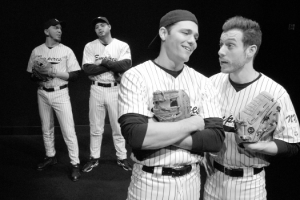For 2nd Story Theatre, 2012 opens with Take Me Out, Richard Greenberg’s provocative examination of “America’s game,” offering a locker room view of how a baseball team reacts when it’s star player suddenly and unapologetically outs himself. Artistic Director Ed Shea promises “it’s one of those plays that people will talk about for seasons to come.”
Thanks to some extremely powerful performances — and plenty of male nudity — he may be right.

Emphasizing the metaphorical nature of baseball for life, Greenberg’s play provokes deep thought but almost crumbles beneath its own weightiness. To many, star baseball player Darren Lemming appears to be one of these gifted godlike athletes endowed with limitless skill and grace. Yet, his announcement tests the boundaries of friendship, loyalty and male camaraderie while challenging long cherished traditions. The play’s biggest obstacle proves to be the uncertainty about what Greenberg attempts to accomplish and whether or not he succeeds.
Shane, the bigoted, knuckle dragging homophobe, seems the play’s obvious villain. But, Jeff Church’s powerful, tour de force performance makes him a tragic and sympathetic figure. Darren (Ara Boghigian) comes off as a manipulative and calculating narcissist. Perhaps, if his cockiness were dialed back just a bit, later efforts at humility wouldn’t seem so shallow. Greenberg doesn’t really give the audience anybody to wholeheartedly cheer for.
The most likeable character may very well be Mason (Kevin Broccoli), Darren’s gay business manager. With an unadulterated passion for baseball, Mason appears to be the only one capable of looking beyond Darren’s homosexuality, continually reminding him why he plays the game and why so many people love the game he plays. In the end, Darren appears to be the one having the most difficulty coming to terms with his sexuality and his role as a baseball god.
When friend and teammate Kippy (Tim White) observes how his coming out has made him less godlike and more human, the young star seems troubled, referring to Kippy’s observation as a “demotion.” This makes one ponder that if he had to do it all over again, be “true to himself” or remain godlike, Darren might just chose the latter.
Another revealing moment occurs when the team’s manager (Eric Behr) subtly accuses Darren of breaking the cardinal rule of all team sports by placing himself above the team….not by coming out, but by intentionally remaining a lighting rod afterward. His belittling of those who simply don’t agree with his lifestyle, or his insistence that Shane be punished more, enflame matters further. Ironically, the linguistically-challenged Japanese pitcher Kawabata (Kyle Blanchette) sums things up rather succinctly: “For many baseball is not just a metaphor, it’s everything.”
Greenberg ratchets-up the already controversial subject matter by continually espousing the Freudian concept that all heterosexuals have latent homosexual tendencies. To promote this idea, the play features heavy doses of male full-frontal nudity, an obvious metaphor for being “outed” or exposed. Suddenly, team members become self- conscious during what used to be the mundane act of showering together, proving, as Greenberg concludes through Kippy, they are all “in denial.” But, as the play progresses, the nudity becomes extraneous and gratuitous culminating in a shower scene that stretches the limits of believability, causing one to truly consider Darren’s calculating nature.
Darren, though, is not alone with his flaws. His best friend Davey (Marlon Carey), who encourages him to “be honest,” ultimately rebukes him for being a “pervert” simply to protect his own masculine image. Kippy, who always tries to do and say the right thing, clumsily contributes to the hatred in more ways than he could possibly imagine.
While Take Me Out has its shortcomings, the performances alone make it a must see.
Runs thru Feb 19, www.2ndstorytheatre.com


